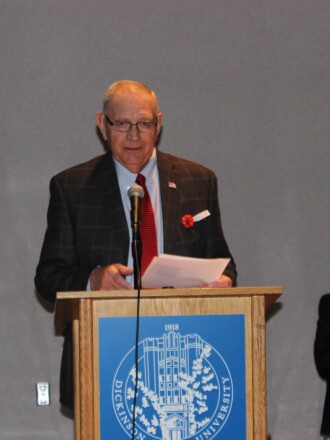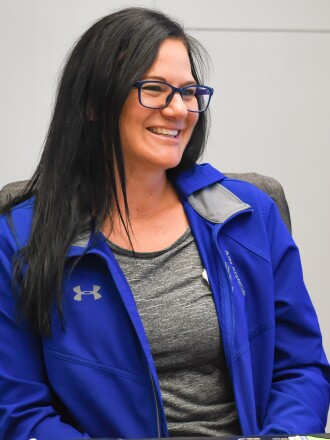DICKINSON — In the aftermath of wars, many service members return home bearing visible scars of their service. For many more, the invisible scars, such as Post-Traumatic Stress Disorder (PTSD), highlight how, for them and their families, the battles are far from over. George Nodland, a veteran who served during a period of ongoing tensions post-1953, often referred to colloquially if inaccurately as the "Second Korean War," epitomizes the struggle many face in the shadow of their service.
Nodland's journey, marked by personal battles with PTSD and the quest for recognition and support from the Veterans Affairs (VA), reflects a broader narrative of sacrifice, misunderstanding and perseverance.

Nodland's military service took him far from his North Dakota home, but the journey back proved to be fraught with its own unique challenges.
"I don’t want to get into detail about what I went through in Korea,” Nodland shared, his experiences overseas still a heavy burden, mirroring the stories of countless veterans who confront similar challenges upon their return.
PTSD, a condition that was not formally recognized until 1980 by the American Psychiatric Association, has since become a critical area of focus for veterans' mental health care, illustrating the evolving understanding of the invisible wounds of war.
ADVERTISEMENT
He did, however, share how upon his return he was confronted with a stark reality.
“I had to fly into Minneapolis before I could get back to North Dakota... back in those days you had to fly in uniform, and people didn’t know we were in Korea; they thought all of us were in Vietnam,” he shared.
Nodland's experience highlights a common misunderstanding among the public, partly fueled by the era's intense focus on the Vietnam conflict. This period was marked by widespread protests and a significant anti-war movement, leading to mixed and sometimes hostile receptions for returning service members, regardless of their actual theaters of service.
"We were just following orders… I was drafted and didn’t have much choice in the matter," Nodland said, reflecting on his compulsory service. His narrative touches on the broader theme of veterans' complex feelings about their service, often overlooked by the civilian population.

According to the former North Dakota state senator, his return to civilian life was marred not only by the mental scars of warfare, but also by the struggle to have those sacrifices acknowledged by the very country he served. The challenge of obtaining disability benefits is a well-documented issue, compounded by the VA's requirement for extensive documentation — a difficult criterion for many older conflicts where records may be incomplete or were never adequately maintained due to the very nature of the conflicts themselves.
Nodland began his quest for disability benefits immediately upon returning, a process marred by the thick red-tape of bureaucracy and the challenge of proving, in a time when medical knowledge of post-traumatic stress disorders were not as well known, the invisible wounds of war.
Nodland began his quest for disability benefits immediately upon returning, a process marred by the thick red-tape of bureaucracy and the challenge of proving, in a time when medical knowledge of post-traumatic stress disorders were not as advanced, the invisible wounds of war.
Jessica McClellan, a Veterans Service Officer in Dickinson who has worked with Nodland in his fight for benefits since 2012, highlighted the uphill battle he and many other veterans faced together.
ADVERTISEMENT
"The biggest hurdle we had was a lack of documentation about his posting and any medical circumstances that were a result of his service," McClellan explained, shedding light on the essential role of Veterans Service Officers.

Veteran Service Officers are advocates crucial in navigating the VA's very complex systems, striving to ensure veterans in their respective areas receive the recognition and support they are entitled to.
This lack of evidence posed a significant barrier in their fight for Nodland's rights to disability benefits, earned through his service in Korea. Despite these challenges, Nodland's story is one of eventual triumph after years and years of struggle.
"It feels so good to finally see him qualify after so many years of hard work and effort,” McClellan said, her voice a testament to the long and arduous journey so many veterans of Nodland's era faced.
This victory is not just personal for Nodland, but serves as a beacon of hope for many veterans facing similar battles in the aftermath of the Persian Gulf conflicts and Global Wars on Terrorism. It underscores the ongoing need for societal recognition, understanding and support for those who have served, according to McClellan.
Nodland was recently approved at 100% disability rating, 18-years after being first denied.
Veterans navigating the aftermath of their service, grappling with challenges similar to those faced by George Nodland, have avenues for support and recognition. The journey toward securing deserved benefits and healing from the invisible wounds of war is a path well-trodden, with resources and assistance available.
The Stark County Veteran Service Office stands ready to aid veterans in their quest for benefits, offering guidance through the complex processes of the Veterans Affairs system. Veterans Service Officers, like Jessica McClellan, are dedicated to providing the support and advocacy necessary to navigate these challenges.
ADVERTISEMENT
For assistance, veterans are encouraged to contact the Stark County Veteran Service Office, located at the Courthouse, 51 3rd Street East, Dickinson, ND 58601. The office can be reached by phone at (701) 456-7654 or via fax at (701) 456-7634. More information, including office hours and additional services, is available on their website under Stark County - Veterans Service Office.
The office is open from Monday to Thursday, 8 a.m. to 5 p.m., and on Friday from 8 a.m. to noon.
Veterans residing in Billings, Hettinger, Grant and Golden Valley Counties are eligible to contact this office for support.









